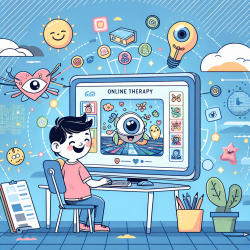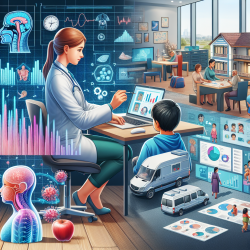Introduction
Individualized Education Program (IEP) meetings are pivotal in shaping the educational journey of children with special needs. As educational psychologists, you play a crucial role in these meetings, ensuring that every child's unique requirements are met with precision and care. With the advent of technology, online speech therapy has emerged as a powerful tool in enhancing the effectiveness of IEP planning and execution.
The Role of Data in IEP Planning
Data-driven decisions are at the heart of effective IEP planning. By utilizing comprehensive data, educational psychologists can tailor interventions that are specific to each child's needs. This not only ensures that goals are realistic and attainable but also fosters a sense of achievement and self-actualization in students.
Online speech therapy platforms, such as those provided by TinyEYE, offer robust data collection and analysis tools. These tools enable therapists and educators to track progress in real-time, adjusting strategies as necessary to optimize outcomes.
Benefits of Online Speech Therapy in IEP Meetings
- Accessibility: Online speech therapy ensures that children receive consistent support regardless of geographical barriers. This is particularly beneficial for schools in remote areas where access to specialized services might be limited.
- Customization: Telepractice jobs offer the flexibility to design personalized therapy sessions that align with the goals set in the IEP. This customization ensures that each child's unique needs are addressed effectively.
- Data-Driven Insights: The integration of technology in therapy allows for the collection of valuable data that can be used to make informed decisions during IEP meetings. This data includes session attendance, progress metrics, and qualitative feedback from both therapists and students.
Implementing Online Speech Therapy in Schools
Implementing online speech therapy requires a collaborative approach involving educators, therapists, and families. Here are some steps to ensure a smooth integration:
- Training: Provide training for educators and therapists to familiarize them with the online platforms and tools.
- Communication: Maintain open lines of communication between all stakeholders to ensure that everyone is informed and aligned with the therapy goals.
- Feedback Mechanisms: Establish feedback mechanisms to continuously assess the effectiveness of the therapy and make necessary adjustments.
Conclusion
Incorporating online speech therapy into IEP planning not only enhances the educational experience for children but also empowers educational psychologists to make data-driven decisions. By leveraging technology, we can create a more inclusive and effective learning environment that caters to the diverse needs of students.
As we continue to embrace these technological advancements, the potential for improved outcomes in special education is limitless. Let us work together to ensure that every child has the opportunity to reach their full potential.










